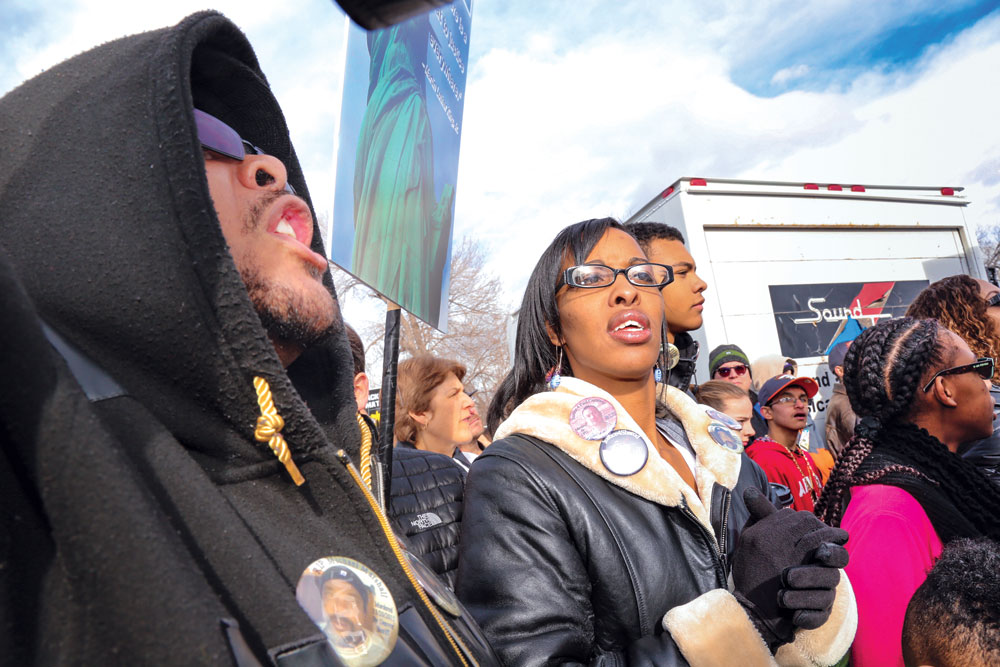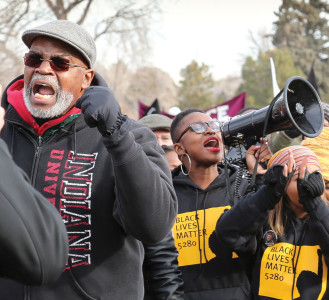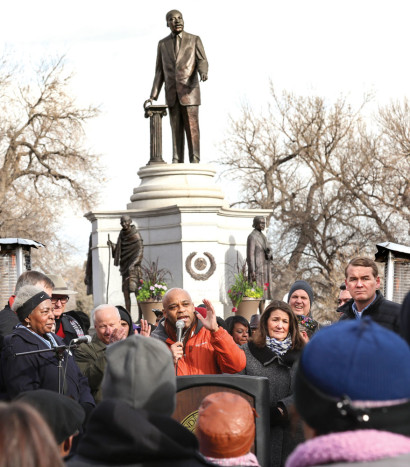
Black Lives Matter 5280 (BLM5280) protesters interrupted speeches at the MLK Day rally in City Park. Natalia Marshall is the niece of Michael Marshall, who was restrained by deputies in the Denver jail and subsequently died.

Black Lives Matter 5280 attended the Martin Luther King Day Parade.
On MLK Day, Black Lives Matter 5280 (BLM5280) disrupted the traditional Marade and rallies, calling for change in the criminal justice system and raising the issues of affordable housing and the Stapleton name. The Front Porch invited the leaders of BLM5280’s Stapleton efforts, Vince Bowen and Bianca Pullen, to have a conversation about the group’s goals.
Bowen, a Park Hill resident, is a Harvard graduate who worked on Wall Street for 10 years in media and technology banking. He just sold a business and this spring will be starting an online business that carries “all things outdoors.” Pullen is in her fourth year of medical school at the CU Anschutz campus and plans to become a psychiatrist.
Bowen and Pullen say their members are active in many ways throughout the community, not just what’s covered in the press. They volunteer as mentors, they hosted a basketball tournament, a gang summit, and an expungement fair where lawyers checked to see if records could be cleared. They want to actively support the effort for more affordable housing in Stapleton—and they acknowledge the name change may be a longer term vision, but talk passionately about why it’s important.
“You write a Green Book saying we’re going to create a model community and 15 years later it’s whiter than Colorado. The easiest welcoming thing you could do is put out a welcome mat that doesn’t say, ‘Stay out of here.’ You’ve got to win on one of these fronts. Affordable housing, diversity, you’ve got to win on something.”
Pullen adds, “If this is a neighborhood that should be approachable, affordable for all people, having the name of a Klansman (Denver Mayor Ben Stapleton) who stood for unequal rights is so symbolic.
“We’re at the place where interpersonal racism is not OK any more. No one is going to come up to me and call me the ‘N word.’ But we are in a time where folks are saying, ‘Is this neighborhood sketchy?’ That question can be code for other questions like, ‘Are there people of color who live there? Are there low-income people who live there?’ People may not be acknowledging that the things they say may be racist or classist, but they are.”
Pullen, knowing her grandmother could only live in a neighborhood for people of color, says, “I have been made to feel as an ‘other’ by those comments.”

Mayor Hancock speaks at the podium.
Bowen and Pullen say this is implicit bias—it’s the new racism. “Everyone does it. Everyone has bias,” they say. Now people need to become aware of the biases that exist in our culture.
Bowen cites an example. “I was in a BLM meeting in Detroit and a woman got up and said, ‘I want to thank you all because this is the largest group of black folks I’ve been around outside of jail. I am a transgender woman and I am generally not accepted in our community because we have a lot of homophobia. In jail there’s sort of a code where we all kind of work it out.’
“I didn’t even think of the notion that this young woman felt uncomfortable next to me,” says Bowen. “I hadn’t done anything to her.” But he was affiliated with a community that “has a lot of homophobia” and that created discomfort for the young transgender woman. Bowen says this was an “aha” moment in which he understood that, in order for any true understanding to take place, white people must learn that their whiteness carries a message, whether or not they are aware of it. Black people, other minorities, and people on the margin live their lives acutely aware their “otherness” carries a message.
“I could have reacted and said, ‘Hey, lighten up. Relax. Why are you making me have to take care of your feelings? Why are you making me be PC?’ What I recognized was that I’ve been in that same position with white folks. And for me to not acknowledge her discomfort and not call her ‘her’ is a disregard of the notion that they’re a human being who deserves to feel totally comfortable and totally able to do whatever. And the cost to me is de minimis. The cost of me being PC is nothing.”
Bowen says for Black Lives Matter to tell white folks in Stapleton to change their name is sort of like if your kids tell you to stop drinking. “It’s a good idea, but you don’t tell me what to do. This is a toxic name, but…I don’t like the idea of somebody who I don’t view as having authority over me telling me what to do.”
Pullen explains how the name Stapleton impacts her, as a person of color. “I can’t just move on from that name. I am black. I can’t ignore it. I can’t get beyond it. If I were to be face to face with a Klansman, my life is at risk. And that is what I think of when I hear that name. I am anxious when I think of that name. So when folks are like, ‘Well, that’s kind of important, but maybe not that important,’ there’s some implicit bias happening there. And implicit bias is making a group that is a minority or disenfranchised group feel uncomfortable and feel like the ‘other.’”
Pullen says microaggressions (everyday verbal and nonverbal snubs and insults that communicate negative messages based on membership in a marginalized group1) have been shown to affect health—higher rates of depression, suicide, anxiety. She believes it’s not about PC, it’s about health.
Pullen and Bowen have been surprised at the lack of response in the Stapleton community for changing the name and suggested businesses, including the Front Porch, can remove it from their names. “Here we are giving information to the community, giving the [Stapleton] United Neighbors group the information to move forward and nothing happens2 … Here’s an opportunity for you to do something and we’re a little disappointed that people haven’t taken up the charge. We’re probably going to have more conversations and say, ‘Can you guys get this going on your own … because we’re trying to keep people from getting killed.’”
The Front Porch pointed out that Stapleton does have an active group that has met for years to push for more diverse and affordable housing—and our personal observation has been that the majority of residents say they would like Stapleton to be a more diverse community. Bowen acknowledged that is counter to the response one might expect from a “self-interested Stapletonian,” who would say, “Change the name. Don’t mess with my schools, don’t mess with my neighbor, don’t mess with my [home] value.”
1From Diversity in the Classroom, UCLA Diversity & Faculty Development, 2014
2Mark Mehringer, president of Stapleton United Neighbors, says SUN has decided not to do a survey on the name change at this time since they are working with Ted Manley, a professor at Johnson and Wales, who will be doing a survey of Stapleton and NW Aurora related to Stanley Marketplace. Manley says people can also cite issues of concern in other areas on that survey.




0 Comments